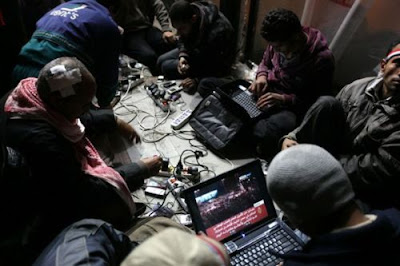 |
| Activists and bloggers in Cairo's Tahrir Square during the height of the protests |
Our generation has created new markets our relentless demand for online media, changed the Internet with the Web 2.0 movement, and has helped globalize pop culture. Yet despite these accomplishments, many doubted that we would have a substantial lasting impact on the world beyond our media consumption. The advent of the Arab Spring and our leadership of the democratic revolutions in nations across the globe have silenced these doubts. Our generation can now add another accomplishment on the growing list, along with a new nickname; the Facebook generation.
 |
| Protesters in the Madrid's Puerta del Sol square on May 21, 2011 |
The revolutions in Tunisia, Egypt, Libya, Yemen, and Syria have taken the world by storm. The media has called the young and web-savvy activists leading the revolutions the ‘Facebook generation’ for their use of online social networking sites unite people across ethnic, religious, and political lines. However, this nickname isn’t unique to the leaders of the Arab Spring. The scrappy and resourceful leaders of the Arab Spring aren’t political geniuses or seasoned activists, but are college students and young professionals seeking to build a new world.
Indeed, the recent democratic protests in Spain that started on May 21, 2011 have proven that the Facebook generation is truly a global generation that encompasses all of us. These recent events have also left no doubt to the Internet’s power in helping light the fires for political change. Social and media networking sites such as Facebook, Twitter, Youtube and Flickr have interconnected our generation in remarkable ways, and the events of the Arab Spring have proven that this interconnection can be translated into unforeseen political power.
 |
| Aftermath of attack on Christian protest in Cairo on May 15, 2011 |
Amongst the euphoria and celebration of the democratic revolutions being led by the Facebook generation, the elephant in the room still remains though; once the protests succeed in toppling the governments, where do the revolutions go from there? Social networks have played a pivotal role in gathering people from all walks of life into becoming a potent political force for change, but so far they have not helped in organizing answers to the complex ethnic, economic and social-political problems that run rampant underneath the surface in many of the nations.
These issues have started to become more evident in the nations that have been at the forefront the Arab Spring movement. The Tunisian economy is still in poor condition, and the government is still made up of elderly career politicians and bureaucrats mostly leftover from the pre-Arab Spring era. In Egypt, the revolutionary fervor has died down to reveal the chaos of renewed religious conflicts, a shattered economy, and an impotent transitional government. Even in Spain, the protests have not helped bring about solutions to the high unemployment rate across the nation.
Despite the sobering realities of the post-revolutionary rebuilding process, there is no doubt that the Facebook generation have guided their nations on a path the overcome their problems. The seeds of popular democracy have been sown, truly democratic dialogue has been started, and political freedom is now a concrete reality instead of a dream. The revolutions going across in nations across the world have established the Facebook generation at the forefront of rebuilding the nations, giving us unprecedented opportunities and power to shape the world around us.
 |
| Libyan rappers recording tracks in support of the rebel cause in Benghazi |
The tools that helped bring about change can also make sure it doesn’t go away. Technology and the Internet will continue to be power tools for our use in rebuilding, helping transparency, promoting efficient governance and giving political voice to the under-represented. With our interconnection across religious, ethnic and geographic boundaries, we have unprecedented access to access support, start dialogue and create alternative solutions that can help resolve the thorny issues in nation building.
We definitely cannot be complacent with what we have done so far. As long as we all continue to strive to find and organize solutions using the powerful tools at our fingertips, time will be on our side. We don’t need to start mass movements like the leaders of the Arab Spring have done, we just need to use the tools given to us to help build a world in our vision. Every step counts, whether it’s one with global implication or just one with local impact, in the end every step taken will help create a legacy that will truly define our generation.
Images credit to AP and associated sites

No comments:
Post a Comment